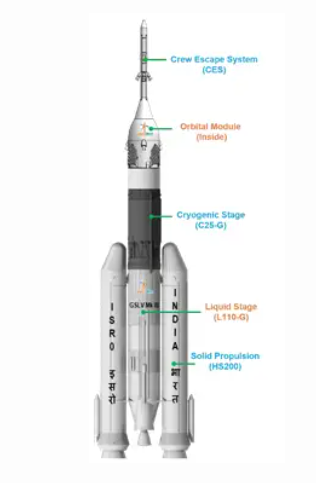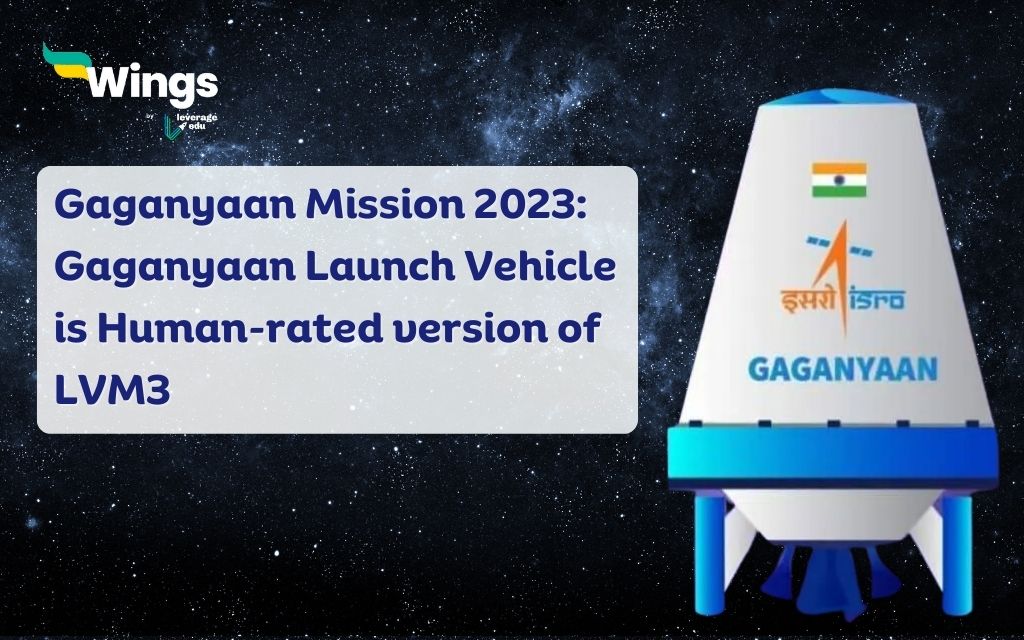The Indian Orbital Crewed Space Mission, Gaganyaan is all set for testing flights on 21st October 2023. The Gaganyaan launch vehicle is the Human-rated version of LVM3, which stands for Geosynchronous Satellite Launch Vehicle Mk III. ISRO released the pictures of the Gaganyaan spacecraft, which will consist of the LVM3 rocket.
Gaganyaan launch vehicle, i.e., HLVM3 consists of a Crew Escape System, a high-burn rate solid motors for ensuring the safety of the Crew Module and the crew in case of an emergency. LVM3 is designed with the objective to carry both the Crew Module and the crew safely into space and back to the earth. Let’s explore more about the Gaganyaan launch vehicle.
Also Read: Which Rocket Was Used for Chandrayaan-3?
Gaganyaan LVM3
The Gaganyaan LVM3, previously known as the GSLV MKIII was developed by ISRO. This is a three-stage-medium-lift launch vehicle, that was previously designed for launching communication satellites into geostationary orbit. Since Gaganyaan is a crewed orbital mission, LVM3 has the capability to carry a load and ensure the safety of the crew even in zero gravity. Thanks to its higher payload capacity than the GSLV.

Also Read: ISRO Gaganyaan Mission
Gaganyaan Orbital Module
The Orbital Module is meant for Orbiting Earth and comprises of Crew Module (CM) and Service Module (SM). Orbital Module is equipped with the most advanced avionics systems with adequate redundancy for human safety. The Crew Module is an inhabitable space with an Earth-like environment for the crew.
Its design includes a double-walled construction with a pressurized metallic Inner Structure an unpressurised external structure and a Thermal Protection System (TPS). It houses crew interfaces, human-centric products, life support systems, avionics and deceleration systems. Moreover, it ensures the safety of the crew during descent till touchdown.
The Service Module will be used to provide necessary support to the Crew Module while in orbit. It is an unpressurized structure containing thermal systems, propulsion systems, power systems, avionics systems and deployment mechanisms.
Related Articles:
| Which Rocket Was Used for Chandrayaan-3? |
| Essay on Chandrayaan-3 |
| Does Chandrayaan-3 Have Humans Inside? |
| Interesting Facts About Chandrayaan-3 |
| Changes in Chandrayaan-3 Post Chandrayaan-2 |
| Satish Dhawan Space Centre (SDSC) Shar Recruitment 2023 |
| Moon Surface Temperature: ISRO Findings |
FAQs
The Gaganyaan launch vehicle is LVM3, which is capable of carrying a crew safely to the lower orbit of Earth.
The Gaganyaan Orbital Module consists of a Crew Module (CM) and a Service Module (SM). Orbital Module is equipped with the most advanced avionics systems with adequate redundancy for human safety.
Gaganyaan will be a manned space mission unlike Chandrayaan, which was an unmanned space mission. Gaganyaan will be like a space mission which will go up to 400km of the Earth’s surface. The Chandrayaan series was solely meant for missions on the Moon.
For more information on such interesting topics, visit our trending events page and follow Leverage Edu.


 One app for all your study abroad needs
One app for all your study abroad needs












 60,000+ students trusted us with their dreams. Take the first step today!
60,000+ students trusted us with their dreams. Take the first step today!